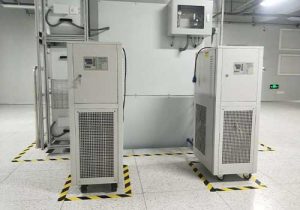60 ton air cooled chiller
Understanding 60 Ton Air-Cooled Chillers: Features, Applications, and Efficiency
Introduction to 60 Ton Air-Cooled Chillers
A 60-ton air-cooled chiller is a substantial piece of industrial equipment designed to cool fluids for various applications. These chillers are part of a refrigeration system that works by dissipating heat through ambient air, making them highly efficient for large-scale cooling needs. They are essential in cooling equipment, maintaining consistent temperatures, and enhancing process efficiency in industries such as manufacturing, food and beverage, and healthcare.

Key Features of 60 Ton Air-Cooled Chillers
The key features of a 60-ton air-cooled chiller include:
High Cooling Capacity: With the ability to remove up to 60 tons of heat, these chillers are suitable for large facilities.
Air-Cooled Design: They use ambient air as a medium to dissipate heat, which allows for more efficient cooling in certain conditions compared to water-cooled systems.
PLC Controller: Provides diagnostics and precise temperature control.
Internal Insulation: Ensures efficient heat retention and prevents heat loss.
Semi-Hermetic Scroll Compressors: Known for their efficiency and reliability.
Safety Controls: Include high and low refrigerant pressure controls, high and low fluid temperature, and low water flow.
Construction: Welded steel powder-coated frames and full metal cabinets with copper piping connections for durability and protection.
Applications of 60 Ton Air-Cooled Chillers

Air-cooled chillers find a diverse range of applications due to their adaptability and effectiveness. They are used in industrial processes, commercial buildings, food and beverage factories, construction works, energy and mining sectors, and more. These chillers help maintain optimal temperatures for processes and spaces, reducing the risk of machine breakdown and overheating.
Efficiency of 60 Ton Air-Cooled Chillers
Chiller efficiency is crucial for reducing energy consumption and operational costs. The efficiency of a chiller can be measured in terms of kW/Ton, COP (Coefficient of Performance), and EER (Energy Efficiency Ratio). A chiller with a lower kW/Ton and higher COP and EER is more energy-efficient. Chiller efficiency also depends on part-load conditions, with IPLV (Integrated Part Load Value) being a key metric for comparing the energy efficiency of chillers under varying loads.
Maintenance of 60 Ton Air-Cooled Chillers
Regular maintenance is essential for ensuring the optimal performance and longevity of 60-ton air-cooled chillers. Maintenance tasks include checking for refrigerant leaks, measuring glycol concentration, maintaining an optimal chilled water flow rate, looking out for non-condensables, examining the compressor oil, inspecting motors and starting mechanisms, and installing variable speed drives for energy savings.
Environmental Impact of 60 Ton Air-Cooled Chillers

The environmental impact of large HVAC air-cooled chillers is a significant consideration. Refrigerants play a crucial role in the refrigeration system, and the selection of refrigerants with low GWP is essential for reducing the environmental impact. The use of ambient air as a cooling medium also contributes to the eco-friendliness of these systems.
Industry Trends and Market Analysis
The global air-cooled chillers market is characterized by a high degree of product innovation, with many manufacturers developing chillers that use low GWP refrigerants. Chiller systems are becoming more intelligent and energy-efficient with advancements in technology. Product features such as energy efficiency, expandability, compact design, low environmental impact, and wireless technology are crucial for the product to succeed in the market.
Conclusion
In conclusion, a 60-ton air-cooled chiller is a vital piece of equipment for high-capacity cooling needs in various industries. Understanding its features, operation, and the factors involved in selection and maintenance is essential for ensuring its effectiveness and efficiency. By choosing the right chiller and maintaining it properly, industries can achieve optimal cooling performance while minimizing environmental impact and operational costs.
Related recommendations
Reasons and Solutions for Industrial Chillers not Cooling
1449Reasons and Solutions for Industrial Chillers not Cooling With the development of science and technology, industrial chillers have become refrigeration equipment in industrial produc...
View detailschiller capacity unit
360Chiller Capacity Units: A Comprehensive ExplanationIn the realm of cooling technology, accurately measuring chiller capacity is fundamental for the design, operation, and maintenance of cooling s...
View detailswater bath pump
523Introduction to Water Bath PumpsWater bath pumps are essential laboratory equipment used to maintain a constant temperature for samples in various applications, including chemical, biological, and...
View detailstemperature controlled solutions
277Temperature Controlled Solutions: A Comprehensive Guide Introduction Temperature controlled solutions play a pivotal role in a vast array of industries and applications. The ability to maint...
View details
 LNEYA Chiller
LNEYA Chiller





HelloPlease log in